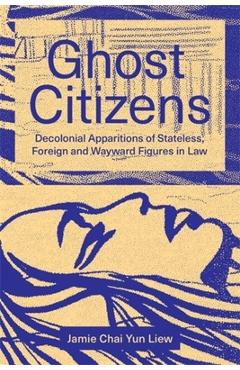Ghost Citizens: Decolonial Apparitions of Stateless, Foreign and Wayward Figures in Law - Jamie Chai Yun Liew

Detalii Ghost Citizens: Decolonial Apparitions of
libris.ro
138.9 Lei
154.33 Lei
Law
Jamie Chai Yun Liew
Ghost Citizens: Decolonial Apparitions of - Disponibil la libris.ro
Pe YEO găsești Ghost Citizens: Decolonial Apparitions of de la Jamie Chai Yun Liew, în categoria Law.
Indiferent de nevoile tale, Ghost Citizens: Decolonial Apparitions of Stateless, Foreign and Wayward Figures in Law - Jamie Chai Yun Liew din categoria Law îți poate aduce un echilibru perfect între calitate și preț, cu avantaje practice și moderne.
Preț: 138.9 Lei
Caracteristicile produsului Ghost Citizens: Decolonial Apparitions of
Comandă Ghost Citizens: Decolonial Apparitions of Online, Simplu și Rapid
Prin intermediul platformei YEO, poți comanda Ghost Citizens: Decolonial Apparitions of de la libris.ro rapid și în siguranță. Bucură-te de o experiență de cumpărături online optimizată și descoperă cele mai bune oferte actualizate constant.
Descriere magazin:
Ghost Citizens is about in situ stateless people, persons who live in a country they consider their own but which does not recognize them as citizens. Liew develops the concept of the ghost citizen to understand a global experience and a double oppression: of being invisible and feared in law. The term also refers to two troubling state practices: ghosting their own citizens and conferring ghost citizenship (casting persons as foreigners without legal proof). Told through an examination of law, legal processes and interviews with stateless persons and their advocates, this deeply researched book examines international and domestic jurisprudence as well as administrative decision making to show an emerging practice where states are pointing to a mother figure, constructed in law as racialized, foreign and potentially disloyal, to depict persons as not kin and therefore the responsibility of other states. By tracing British colonial legal vestiges in the case study of Malaysia, Liew shows how contemporary post-colonial, democratic and multi-juridical states deploy law and its processes and historical ideas of racial categories to create and maintain statelessness. This book challenges established norms of state recognition and calls for a discussion of ideas borrowed from other areas of law, including Indigenous legal traditions and family law, on how we should organize our communities with more respectful relations and treatment among kin.

Produse asemănătoare

Ghost Citizens. Decolonial Apparitions of Stateless, Foreign and Wayward Figures in Law, Paperback/Jamie Chai Yun Liew
![]() elefant.ro
elefant.ro
Actualizat in 26/10/2025
151.99 Lei
Produse marca Jamie Chai Yun Liew

Ghost Citizens: Decolonial Apparitions of Stateless, Foreign and Wayward Figures in Law - Jamie Chai Yun Liew
![]() libris.ro
libris.ro
Actualizat in 18/03/2025
138.9 Lei
